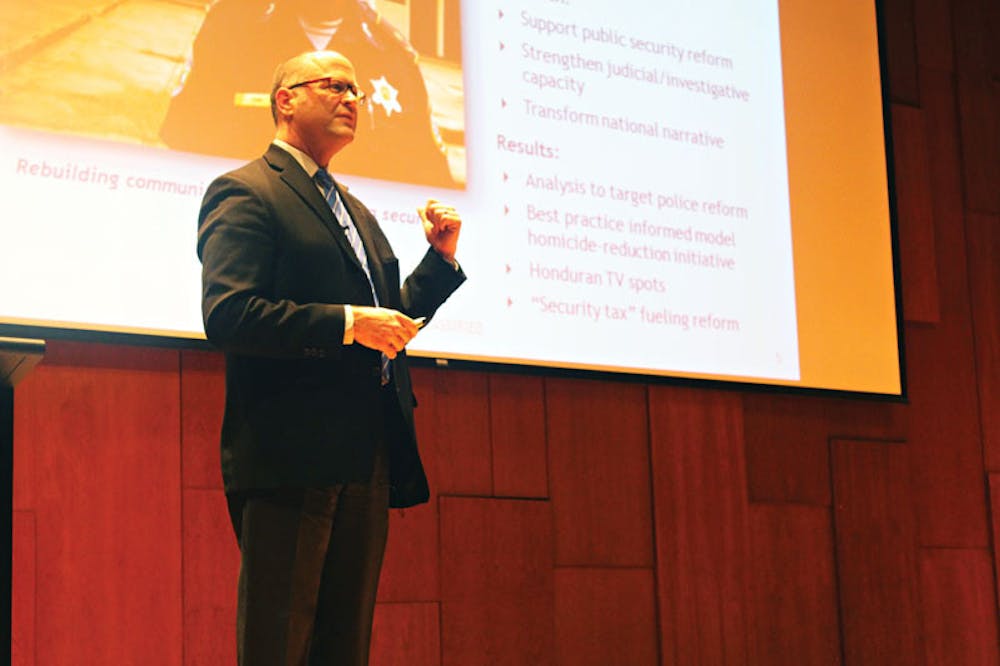Being a victim “is almost like an addiction,” said Jerry White ’86, a Nobel Peace Prize laureate and deputy assistant secretary of state, to an audience around 80 to 90 people in Salomon 101 Thursday evening.
Victimhood “is insatiable,” said White, who spent a decade interviewing landmine victims and lost his leg in a landmine explosion while studying abroad in Israel as an undergraduate. A tendency for “living in the past” is often a main symptom of continued victimhood, he said.
White won the 1997 Nobel Peace Prize for his activism with the International Campaign to Ban Landmines and is the author of “Getting Up When Life Knocks You Down: Five Steps to Overcoming a Life Crisis.”
“Brown was fundamental in part because it incubated intellectual curiosity and freedom,” White said as he opened his talk. “It was that interdisciplinary approach that has helped me think about social movements and engage all types of people of all backgrounds on all types of complicated issues of our day.”
When he was pursuing his degree in Judaic Studies, White said his adviser encouraged him to go to Israel to learn Hebrew.
Years later, White was working on a project on nuclear, biological and chemical weapons when he met Ken Rutherford, a fellow landmine survivor, who he said persuaded him to focus on landmines instead.
Rutherford told White that his combination of personal and professional experience made him an ideal person to join the International Campaign to Ban Landmines, White said.
“A light bulb went off,” he said. “I thought it was rather a great thing in life that something that is cerebral … could combine with actually the human side — the humanitarian heart.”
White said his work with the campaign led him to consider what allows some victims to overcome their misfortunes and become “survivors” — what he called the “recipe for resilience.”
The path to becoming a survivor requires a victim to face facts, find meaning in life, reach out to others, take an active role and give back, he said.
Explaining the idea of being active, White recalled his first time in a wheelchair during his recovery. He said he looked up at the nurse and the nurse said, “If you want to move, then push.”
White currently works in the Bureau of Conflict and Stabilization Operations, which was established to meet a need for civilian conflict specialists that was identified in the Quadrennial Diplomacy and Development Review, he said.
The CSO uses targeted analytics and interagency strategy building to effect change within 12 months of entering conflict, White said. The bureau’s role is not to get involved in every conflict but to select priority areas where it can make an immediate impact.
White discussed the CSO’s efforts to prevent electoral violence in Kenya and assist the crisis response in Syria as examples of the bureau’s work.
In Kenya — where elections were held Monday — the grievances that fed into electoral violence in 2007 have not dissipated, he said. The CSO responded to the challenge by stationing a team in the area to support electoral reforms and used advanced analytics to identify potential violent outbreaks, he added.
The possibility of a run-off election in May — which will depend on how close the vote is and the legitimacy of the election — has further complicated the situation, he said.
In Syria, the CSO built a network of 2,000 activists and distributed 4,000 pieces of “non-lethal” equipment to the opposition, White said. The bureau also provided 500 hours of training to Syrian civilians.
When Syrian President Bashar al-Assad blacked out Internet and phone systems in preparation for a major attack, radio shows and other communication channels enabled by the CSO were still available for the opposition to connect with each other and enlist help, White said.
“This is probably as socially entrepreneurial as it gets in government — to be part of the start-up of a new bureau,” he said.
White said he encountered a resistance to thinking about the way religion affects and drives conflict when he got to the State Department.
The CSO’s major innovation in progress this year is likely the launch of an office of religious engagement, White said, which will try to galvanize faith communities and coordinate their action in the bureau’s work abroad.
A previous version of this article incorrectly stated that around 50 people attended a talk given by Jerry White ’86. In fact, between 80 and 90 people attended. The Herald regrets the error.

ADVERTISEMENT




